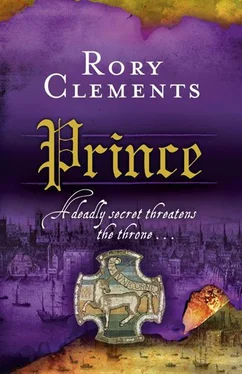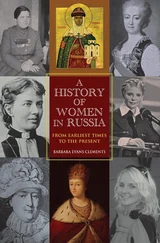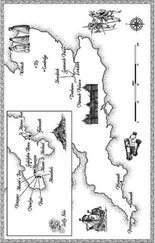Rory Clements - Prince
Здесь есть возможность читать онлайн «Rory Clements - Prince» весь текст электронной книги совершенно бесплатно (целиком полную версию без сокращений). В некоторых случаях можно слушать аудио, скачать через торрент в формате fb2 и присутствует краткое содержание. Жанр: Исторический детектив, на английском языке. Описание произведения, (предисловие) а так же отзывы посетителей доступны на портале библиотеки ЛибКат.
- Название:Prince
- Автор:
- Жанр:
- Год:неизвестен
- ISBN:нет данных
- Рейтинг книги:5 / 5. Голосов: 1
-
Избранное:Добавить в избранное
- Отзывы:
-
Ваша оценка:
- 100
- 1
- 2
- 3
- 4
- 5
Prince: краткое содержание, описание и аннотация
Предлагаем к чтению аннотацию, описание, краткое содержание или предисловие (зависит от того, что написал сам автор книги «Prince»). Если вы не нашли необходимую информацию о книге — напишите в комментариях, мы постараемся отыскать её.
Prince — читать онлайн бесплатно полную книгу (весь текст) целиком
Ниже представлен текст книги, разбитый по страницам. Система сохранения места последней прочитанной страницы, позволяет с удобством читать онлайн бесплатно книгу «Prince», без необходимости каждый раз заново искать на чём Вы остановились. Поставьте закладку, и сможете в любой момент перейти на страницу, на которой закончили чтение.
Интервал:
Закладка:
‘There is much work to be done.’
‘And we shall need much powder to carry it out to our satisfaction. After this, we shall want a hundred and twenty barrels for our next little turn, all of which must be brought forth and sieved…’
Curl stopped abruptly as he was about to haul up the next barrel. ‘Did you say a hundred and twenty, Mr Laveroke?’
‘I did, Mr Curl.’
‘Why, that is enough to blow up a small town!’
‘I hope so. I do hope so.’
Shakespeare raised his hand to hammer at the great door of the Gaynes Park Hall. Set in parkland amid tall trees, this was a house belonging to an aunt of the Earl of Essex’s wife, Frances Walsingham, through her first marriage to the heroic Philip Sidney. The old manor-house was far from palatial, but it would do well enough as a hideaway for a Spanish fugitive and his small train. Before his fist came down against the wood, a hand grasped his wrist in a grip of iron. Shakespeare turned. The hand belonged to one of three burly, heavily armed men who appeared beside him, seemingly from nowhere.
‘Yes?’ the one who held him said. He was wearing the tangerine tabard of the Earl of Essex’s retinue, above military mail, as were his two comrades. They were clearly bodyguards.
‘My name is John Shakespeare. I am here on Queen’s business to see Don Antonio.’
‘Well I am Edward Wilton, chief of the guard, so I shall require your letters-patent and ask you to disarm.’ He released his grip on Shakespeare’s wrist.
Shakespeare had brought no firearm. He handed over his sword and dagger and the paper Cecil had given him. Wilton studied it, then ran his strong-fingered hands across Shakespeare’s clothing, searching for secreted weapons. When he found none, he stood back. ‘Thank you, sir. That is in order.’ He opened the door. A footman in a yet finer tangerine and black livery answered the door. He looked nervous and tired, as if he would rather be anywhere else in the world than here.
The footman bowed and retreated into the darkness of the hall without a word.
‘Collect the sword on your way out, Mr Shakespeare,’ Wilton said.
Shakespeare did not wait to be invited in, but stepped into the hallway and shut the door behind him. He looked about at his surroundings. The place appeared as fatigued as the footman. Above the wainscot, the plasterwork was rent and falling away in places and much of it seemed disfigured by damp and dark yellow and brown blots. There were no portraits, nor any hangings. There was a strong smell of rot. Shakespeare guessed that the house had been unoccupied for years and opened up only recently to accommodate Antonio Perez and his entourage.
‘How may we help you, Mr Shakespeare?’
Shakespeare turned around at the sound of the heavily accented voice; a Spanish accent — something to chill the heart of any Englishmen in these long days of warfare between the two countries. He was face to face with a tall young man, perhaps half an inch above his own six feet. The man was well dressed, in a doublet of silver and black brocaded velvet and slashed silver sleeves. His hair was long, black and combed back. His skin was copper-dark with a sheen of robust health.
‘Don Antonio?’ Even as he said the words, Shakespeare realised it was a foolish question. This man was half Perez’s age.
The man smiled with something akin to condescension. ‘I am his personal secretary, Mr Shakespeare.’
‘I am sent by Sir Robert Cecil. I am told Don Antonio would talk with me.’
‘We were expecting you. But it is very early in the morning. Don Antonio has been unwell and tends to sleep in until midday. Perhaps you will come back later — or would you care to wait?’
‘I will wait. But I would be grateful if he could be woken a little earlier. I have pressing business.’
‘I understand, sir. Let me show you to the parlour and I will alert Don Antonio to your presence as soon as I dare. Would you care for something to eat or drink?’
Shakespeare declined and followed the Spaniard through to a slightly more comfortable room with a settle, a card table and a few books. A tall cedar of Lebanon dominated the gardens outside the window and took most of the light from the room.
The secretary bowed without a great deal of deference and said he would have the servants light a fire, then disappeared. A plain young rustic girl came in, nodded quickly and fearfully to him, then attended to the fireplace. It occurred to Shakespeare that a fire was the last thing he needed on so fine a day, but he suspected the house needed as much warmth as it could get and, anyway, watching her passed the time. Soon the sound of crackling logs and the joyful light of a blazing fire brought some cheer to the room.
Shakespeare sat back and skimmed through the books. They were all Spanish poetry, which did little for him except test his command of the language, which was not, he realised, what it had once been. There were few Spaniards to talk to in London these days, and had not been, in fact, in the nine years since Ambassador Mendoza was expelled from England. The only Spanish that Shakespeare read now was in decoded intercepts of letters criss-crossing between the courts of Europe.
He was just grappling with Herrera’s Rimas Juventiles — youthful rhymes — when a woman swept into the room unannounced. Shakespeare turned at the creak of the door and the rustle of her gown. She was dressed for riding in a long velvet cape, a simple dress of fine brown worsted with a safeguard to protect it, a white linen partlet about her breast and a cap adorned with a feather. Most striking of all, she wore a black patch over her left eye. The only time Shakespeare had ever seen a woman affect such a decoration was in a portrait of the notorious Princess of Eboli, said to have been lover and co-conspirator to Perez. Who was this woman who looked so like his former love?
She carried a hunting-crop in her small white-gloved hand. She stopped and gazed with her one seeing eye at Shakespeare, looking him up and down as a horse trader might appraise a prize stallion. Even in her respectable riding attire, a man could not help but notice the voluptuousness of her body, which shimmered even as she stood still.
‘I had heard that we had a visitor,’ she said in slightly stilted English. Her voice was husky and warm, with the mellow, sing-song timbre of her native Spanish. ‘I must say, you do not look like one of King Philip’s assassins. But who can tell? Everyone I meet these days seems to be a spy or a mercenary.’
‘I am no assassin, senora.’
‘My name is Ana Cabral,’ she replied, holding out her delicate hand to Shakespeare. ‘Dona Ana. And if you were an assassin, sir, I assure you that you would not get very far. My lord of Essex has the place swarming with his men-at-arms.’
Shakespeare took the gloved hand and bent to kiss it. It remained in his hand a few beats too long.
‘I am with Don Antonio’s party, his travelling companion…’
He did not need to ask in what capacity she accompanied Perez. Something about her manner told him she was his cortisane. He guessed her age at twenty-four or twenty-five. She was fair-haired with a streak of silver through one side of her well-coiffed locks. Her English, though accented, was clear-spoken and accurate. She had about her the sensuous demeanour of courtesans everywhere. Perhaps she was born with it. No man could look at her and fail to wonder how she would move beneath the sheets. She was not beautiful, nor even pretty, but she did not need to be, for she dazzled like a rare jewelstone. She would know, Shakespeare thought, all the sexual wiles necessary to keep a man beguiled in bed for as long as she desired, or as long as he had gold enough. She was worldly.
Читать дальшеИнтервал:
Закладка:
Похожие книги на «Prince»
Представляем Вашему вниманию похожие книги на «Prince» списком для выбора. Мы отобрали схожую по названию и смыслу литературу в надежде предоставить читателям больше вариантов отыскать новые, интересные, ещё непрочитанные произведения.
Обсуждение, отзывы о книге «Prince» и просто собственные мнения читателей. Оставьте ваши комментарии, напишите, что Вы думаете о произведении, его смысле или главных героях. Укажите что конкретно понравилось, а что нет, и почему Вы так считаете.












